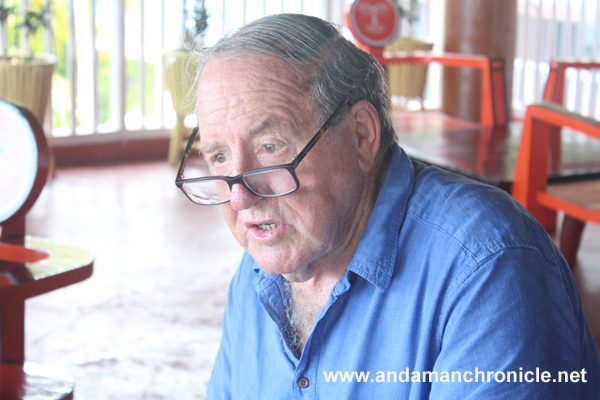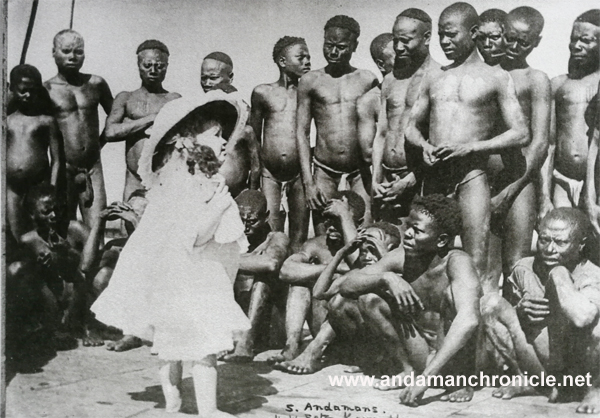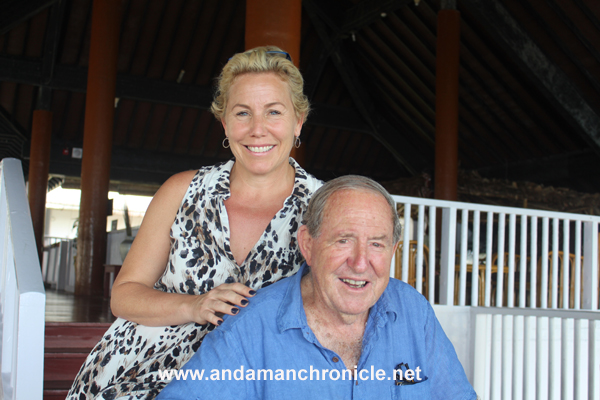
By Ambika Pradhan S
As the dusk sets in and the clouds slowly begin to turn from hues of pink to purple, Jonathan Lawley sits in the hotel lobby overlooking the sea. There’s a constant hum of the waves crashing and the gentle summer breeze wafts in the air. Flipping through the writings of his grandmother Elizabeth and his aunt Mary, this 81 year old man talks with childlike excitement about his relationship with India and the Andaman islands.
Jonathan was born in the north western frontier province, where his father worked in the Indian Engineering Service. Most of his early years were spent in Kashmir valley, in a boarding school where young boys were taught boxing and mountain climbing, apart from regular education. “I’m skeptical on going back to Kashmir today. I’m afraid that my memories from the valley will be spoilt” he says. After India gained independence, 8 year old Jonathan moved to Africa, where he spent most of his work life in different roles like supervising the elections Zambezi valley, training indigenous people at Rio Tinto mining company and acting as the District Commissioner in Zambia. His Ph.D. thesis, ‘Transcending Cultures: Developing Africa’s Managers’ reflects the work he did in the continent. After retiring in 1996, Jonathan Lawley was appointed as the first director of the Royal African Society. He now runs the South African Business Forum, where he combines his unique experience of British colonial service and business in modern Africa.
The Island Connection

When Jonathan wrote his memoir ‘Beyond the Malachite Hills: A life of colonial service and business in new Africa’ little did he expect it would turn out to be a huge success. “The book got good reviews from the critics and became successful” he recalls. “I would also like write a book on the wild places in Africa someday” he says enthusiastically.
The old Indian connection came calling to Jonathan when he decided to write about his family involvement in colonial India. While doing so, he stumbled upon writings of his grandmother and aunt, who lived in the Andaman and Nicobar islands for more than 24 years. “My mother preserved all these writings of my grandmother and aunt. They are more than a century old. In fact, few writings of my grandmother Elizabeth goes way back to the finals decades of 19th century, when she was assisting her uncle in keeping the house. Most of the stories include descriptions of social life in the islands, sailing, and fishing and of the prisoners in Ross Island.”
“My Grandfather R.F. Lowis carried out a census of the islands in 1911, which was later published in the book ‘Census of India, 1911, Volume 2: The Andaman and Nicobar islands’. It included traces of history of the island and the population of the tribes in the islands. He had a good relationship with the tribes. From what I gather, it was difficult to estimate the population of the Jarawas, since they were hostile. But the population of the Great Andamanse was already plummeting.”

After coming across the problems of tribes in the islands, wherein Human Safari in the Jarawa Tribal Reserve goes on in spite of the Supreme Court of India’s ruling, Jonathan started reading more on the issue on the internet and his interest moved from the family memoir to the situation of the tribes. He, along with his daughter Julliet decided to visit islands from London. “I cannot write a book on the island without visiting it. I really like the Andaman and Nicobar islands. The people and cultures here is so diverse” he says. “In my opinion, the tribes should be left alone to live the same life they’ve been living for the last 60,000 years. They know that contact with the outside world means extinction. I hope the expansion of tourism does not affect the survival of the tribes. I hope I can explore the islands and know more about the issue so I can include it in my book.” he concludes.